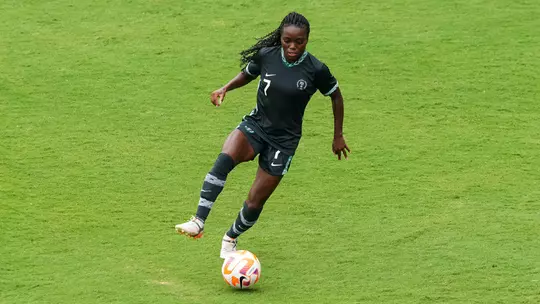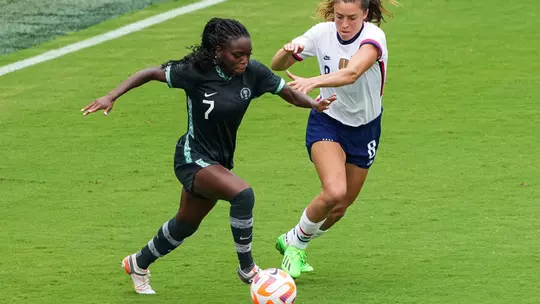
Payne on Olympic Dream, Representing Nigeria
David Shumate, GoDuke The Magazine
In the 15.12 edition of GoDuke The Magazine, David Shumate sits down with former Duke soccer star Toni Payne to discuss her journey to the Olympics and her experience representing Nigeria on the global stage, including insights into her transition from Duke to international acclaim. Payne and Nigeria begin their Olympic quest against Brazil in Women's Group C on July 25 at 1 p.m., with the match broadcast on Peacock/Telemundo.
David Shumate: Let’s start by discussing what the Olympics mean to you, because I know you’ve been involved with the Nigeria Women’s Soccer team for a while, and have been to the World Cup and everything that goes into that. But where do the Olympics fit into it for you?
Toni Payne: I think when I was younger, and kind of even now playing professional football, but going back to when I was playing in college, I always had three really big dreams of mine. First to just play professionally, also playing in a World Cup and then to play in the Olympics. So, this obviously, entering into the first few matches, is going to be a tick off of my list.
Honestly, I feel really happy that I’m able to represent Nigeria as well in doing it because when I was younger, I obviously grew up in the U.S. and I didn’t even think that this would be a possibility and now that it is, I’m just super excited.
DS: Yeah, I was hoping you could talk a little bit about that, your connection to Nigeria through your parents, Oyeleke and Mojemilat, and what that means to you to play for Nigeria.
TP: Yeah, I mean it’s feels really great to be able to represent my parents. You know, they’ve given me everything, they’ve helped me to start this career in football. To be able to represent them and obviously Nigeria is… it’s just an amazing feeling and I feel such a strong connection with the team. It’s definitely an experience that is unlike any other, the camaraderie of it all. It’s really great.
DS: I’m curious, and I might be wrong on this, but I think people are a little bit naive to the qualification process for some of these tournaments, these finals and the Olympics. It seems like it’s incredibly difficult. If you could, take us through the qualification process. I know it’s the first trip for Nigeria to the Olympics since 2008 and you were able to beat South Africa in the fourth and final round of qualifications. But what was that process like just to get to Paris.
TP: I would argue that it’s harder than qualifying for the World Cup as only two teams from Africa qualify. So yeah, it was definitely a long journey having to beat Cameroon and also having to beat South Africa, two obviously really strong teams. South Africa are the defending African champions, so that was definitely a tough game for us, but we were just happy to get the result and obviously being one of the two countries to represent Africa.
So yeah, it’s definitely not an easy process, but we’ve shown that we’re really good too, and we deserve to be here, so it’s nice.

DS: There’s the result of qualifying and then there’s the result of being officially named to the team. What is that process like when you officially get the word? Is it like being selected for the NCAA Tournament or being offered a scholarship? What are the feelings, the emotions, when you finally know you’re going be on the squad going to Paris?
TP: You get called into camps leading up to the tournament, but everyone knows that it’s a very short list, there are only 18 players so the roster’s extremely tight. Once you get the notification or you get the call from the coach, it’s obviously such a relief and such an amazing experience. I’m honestly really grateful to be able to be here and then also to be able to be here with my sister as well since we both made the roster. So this is definitely a special tournament for me.
DS: I was about to ask you about Nicole — did you guys find out together? Were you together or was that like your first phone call to figure out are we both on the team? How did that go down?
TP: Nicole is playing in the NWSL right now and I’m still in Europe. I was actually on my vacation, she was at her club, but we got separate calls and as soon as we got the call, we called each other. We were just super-excited, and our parents are excited too and it’s going be great that they can see both of us represent Nigeria in Paris.
DS: That’s awesome. For Duke fans that are following you beyond just the international piece, take us through what’s going on with you now professionally?
TP: I’ve spent the past six years in Seville in Spain for my club side. I am going to be making a move to another league and to a different team. So that’s going to be definitely a big change but I’m super excited and I think that they should be expecting something new.
DS: I do want to ask you briefly about your time at Duke as well. Obviously the 23 goals, 21 assists, all the starts and all the matches you played in during your career here still stand out. What do you remember most about your time? When you look back at it, does it feel like yesterday, does it feel like a lifetime? What do you make of your time at Duke when you have a chance to reflect?
TP: Honestly, I feel like time has gone by so quickly. It feels like I was just there yesterday. College soccer is an experience that’s just so unique. I think just the unity and the camaraderie that you get in college sports, you don’t really get in the professional game at the next level, so I definitely miss that aspect.
Just being able to play with such amazing people over the four years and obviously being with Robbie (Church, the Duke head coach), that’s something I’m so grateful for and it’s definitely propelled me to where I am now. I’m always grateful to Duke — they’re the reason I’m here today.
DS: You touched on the camaraderie. I’m curious about the developmental piece as well. When, when you look back at that time, how important was that period in terms of developing you into a professional?
TP: I think going into it, being a young player and then going into college, I think you’re forced to be a part of something bigger than yourself. You’re not just playing for yourself; you’re playing for your school and you’re representing your school. So I think it forces a lot of growth in a very positive way, and I think that is really the turning point that a lot of players experience in their development. Now a lot of the younger players are going straight to pro, straight out of high school and I think they can miss a little bit of that. I love to see the game growing, but I think college soccer was definitely such a vital turning point for me.
DS: Now I’m biased here, but Robbie Church is the best. So I’m curious about your relationship and what he’s meant to you as you’ve grown obviously within the college ranks and now into the professional side of your career.
TP: Yeah, I think Robbie is, well your bias is so warranted! I mean he is one of the best coaches I’ve ever had in my soccer career. Just his positivity and the confidence that he gives you as a player, he really helps you to believe that there is no limit if you put in the work. I’m so grateful to Robbie. Without him, I’m not sure if I would still be playing now. I’m just so grateful for the experiences I had at Duke and with him as the head coach.
DS: Well, as we wrap this up, and you can go whichever direction you want — I know you’re based in Europe so you’re somewhat familiar with the area, but looking ahead to Paris and the Olympics, what are you most looking forward to beyond the competition side of things?
TP: You definitely hear a lot of things from past athletes who have attended the Olympics, but I think this one in Paris is going to be quite unique. I don’t think that we as women’s football, and I don’t think men’s football either, there are going be very many games in Paris. I think we’re a little bit outside (the city). We have a game in Bordeaux and Nantes so I’m not sure how much of the Olympic experience we’re going to get, but just the fact that we’re there and we’re competing, you know, that’s all I really care about.
This interview originally appeared in the 15.12 issue of GoDuke The Magazine – July 2024. Dedicated to sharing the stories of Duke student-athletes, present and past, GoDuke The Magazine is published for Duke Athletics by LEARFIELD with editorial offices at 3100 Tower Blvd., Suite 404, Durham, NC 27707. To subscribe, join the Iron Dukes or call 336-831-0767.
